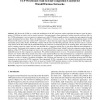Free Online Productivity Tools
i2Speak
i2Symbol
i2OCR
iTex2Img
iWeb2Print
iWeb2Shot
i2Type
iPdf2Split
iPdf2Merge
i2Bopomofo
i2Arabic
i2Style
i2Image
i2PDF
iLatex2Rtf
Sci2ools
135
click to vote
WINET
2002
2002
TCP Westwood: End-to-End Congestion Control for Wired/Wireless Networks
Abstract. TCP Westwood (TCPW) is a sender-side modification of the TCP congestion window algorithm that improves upon the performance of TCP Reno in wired as well as wireless networks. The improvement is most significant in wireless networks with lossy links. In fact, TCPW performance is not very sensitive to random errors, while TCP Reno is equally sensitive to random loss and congestion loss and cannot discriminate between them. Hence, the tendency of TCP Reno to overreact to errors. An important distinguishing feature of TCP Westwood with respect to previous wireless TCP "extensions" is that it does not require inspection and/or interception of TCP packets at intermediate (proxy) nodes. Rather, TCPW fully complies with the end-to-end TCP design principle. The key innovative idea is to continuously measure at the TCP sender side the bandwidth used by the connection via monitoring the rate of returning ACKs. The estimate is then used to compute congestion window and slow sta...
Related Content
| Added | 23 Dec 2010 |
| Updated | 23 Dec 2010 |
| Type | Journal |
| Year | 2002 |
| Where | WINET |
| Authors | Claudio Casetti, Mario Gerla, Saverio Mascolo, M. Y. Sanadidi, Ren Wang |
Comments (0)

